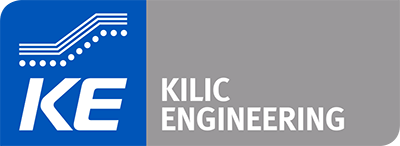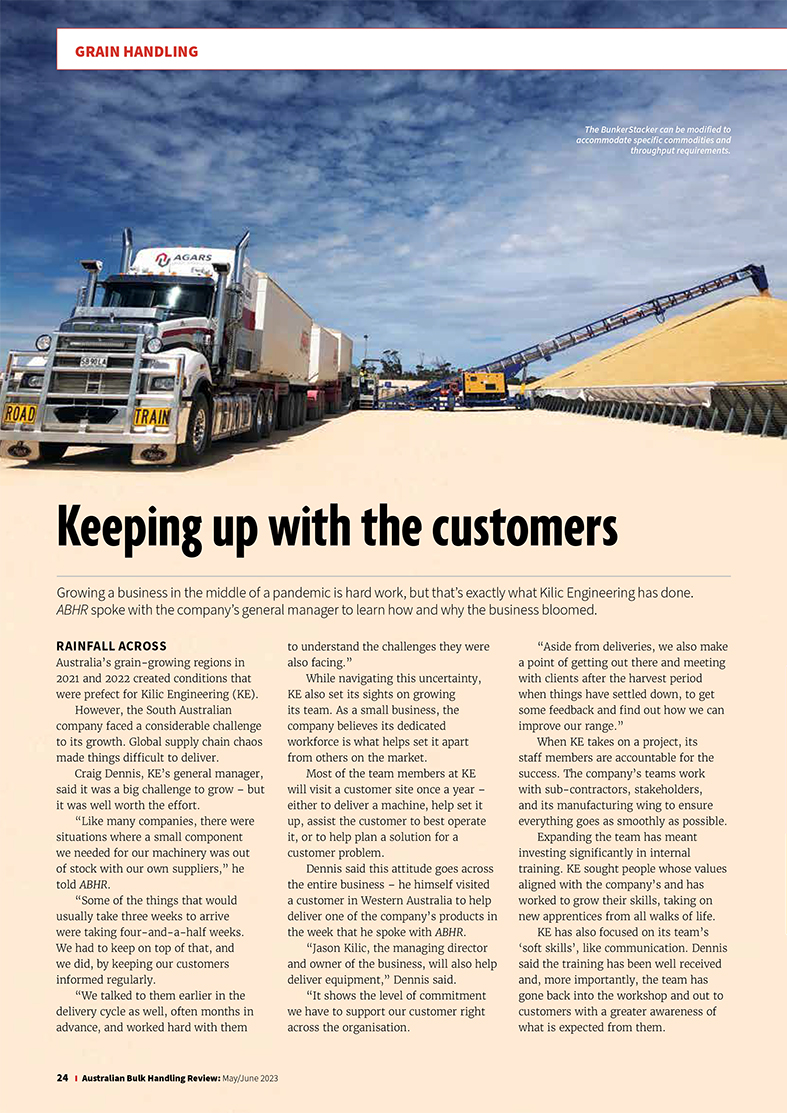Grain Handling – Keeping up with customers
Australian Bulk Handling Review magazine
Growing a business in the middle of a pandemic is hard work, but that’s exactly what Kilic Engineering has done. ABHR spoke with the company’s general manager to learn how and why the business bloomed.
Rainfall across Australia’s grain-growing regions in 2021 and 2022 created conditions that were prefect for Kilic Engineering (KE). However, the South Australian company faced a considerable challenge to its growth. Global supply chain chaos made things difficult to deliver. Craig Dennis, KE’s general manager, said it was a big challenge to grow – but it was well worth the effort. “Like many companies, there were situations where a small component we needed for our machinery was out of stock with our own suppliers,” he told ABHR. “Some of the things that would usually take three weeks to arrive were taking four-and-a-half weeks.
We had to keep on top of that, and we did, by keeping our customers informed regularly. “We talked to them earlier in the delivery cycle as well, often months in advance, and worked hard with them also facing.” While navigating this uncertainty, KE also set its sights on growing its team. As a small business, the company believes its dedicated workforce is what helps set it apart from others on the market. Most of the team members at KE will visit a customer site once a year – either to deliver a machine, help set it up, assist the customer to best operate it, or to help plan a solution for a customer problem. Dennis said this attitude goes across the entire business – he himself visited a customer in Western Australia to help deliver one of the company’s products in the week that he spoke with ABHR. “Jason Kilic, the managing director and owner of the business, will also help deliver equipment,” Dennis said. “It shows the level of commitment we have to support our customer right across the organisation.
“Aside from deliveries, we also make a point of getting out there and meeting with clients after the harvest period when things have settled down, to get some feedback and find out how we can improve our range.” When KE takes on a project, its staff members are accountable for the success. The company’s teams work with sub-contractors, stakeholders, and its manufacturing wing to ensure everything goes as smoothly as possible. Expanding the team has meant investing significantly in internal training. KE sought people whose values aligned with the company’s and has worked to grow their skills, taking on new apprentices from all walks of life. KE has also focused on its team’s ‘soft skills’, like communication. Dennis said the training has been well received and, more importantly, the team has gone back into the workshop and out to customers with a greater awareness of what is expected from them.

“We work hard to get and retain good people,” he said. “We’ve spent a lot of hours recruiting and its definitely paid off.” The company’s design and engineering team also works closely with customers. KE has the engineering and drafting skills needed to modify its existing range of equipment to solve particular problems a customer may be facing. The Roo BunkerStacker product is one of KE’s most popular pieces of equipment, thanks to its speed and ease of use. The machine can unload product and create a grain pile at 600 tonnes per hour.
Farmers, truck drivers and machine operators have said they appreciate the easy loading system – deliveries can be made by driving over the 6m dumping zone and leave up to 12 tonnes to be moved. The machine is self-propelled and is a self-contained work centre, reducing the workload needed. The BunkerStacker can also be modified to accommodate specific commodities and throughput requirements. Dennis said the business has exported the machines to customers across the world, including Japan and Qatar, and has worked with its customers to modify its systems to fit the application. “In 2022, we built a machine to handle some pretty nasty scrap metal product,” he said. “A recycling company had approached us and asked if we could provide a conveying solution for them. “We got a hold of the scrap material they wanted to move and tested it in the factory. We were able to modify the equipment and prove it would work in their application.”
Customer feedback is a vital part of KE’s product development process, which is why it is looking to increase the amount of automation in its equipment. The company’s customers are looking for ways to reduce the amount of manpower needed to sustain their operations. This is especially true in rural Australia, where workforce numbers are in decline. KE aims to increase the amount of telemetry and sensors in its machines, so one operator can handle multiple pieces of equipment – reducing the workload. It also plans to expand physically. Dennis said the growth in staff has not come with a change in the company’s footprint, which it soon plans to change. “We’re looking to expand our premises and grow,” he said. “There’s several initiatives that we have planned for 2023 to keep up with the demand. “Even with all this, KE’s order book is filling up fast for equipment to be delivered by harvest this year.”
William Arnott
Australian Bulk Handling Review, May/June 2023
Related stories:
Kilic Engineering turns expectations into reality
Kilic Engineering delivers the goods for CBH harvest
Reaping the benefits with SEW Eurodrive and Kilic Engineering
Click on the image to view the original article as a PDF.


